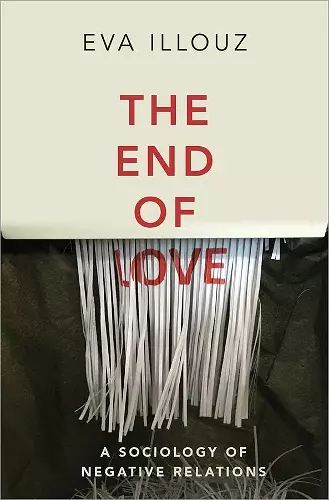The End of Love
A Sociology of Negative Relations
Format:Paperback
Publisher:John Wiley and Sons Ltd
Published:3rd Sep '21
Should be back in stock very soon

Western culture has endlessly represented the ways in which love miraculously erupts in people’s lives, the mythical moment in which one knows someone is destined for us, the feverish waiting for a phone call or an email, the thrill that runs down our spine at the mere thought of him or her. Yet, a culture that has so much to say about love is virtually silent on the no less mysterious moments when we avoid falling in love, where we fall out of love, when the one who kept us awake at night now leaves us indifferent, or when we hurry away from those who excited us a few months or even a few hours before.
In The End of Love, Eva Illouz documents the multifarious ways in which relationships end. She argues that if modern love was once marked by the freedom to enter sexual and emotional bonds according to one’s will and choice, contemporary love has now become characterized by practices of non-choice, the freedom to withdraw from relationships. Illouz dubs this process by which relationships fade, evaporate, dissolve, and break down “unloving.” While sociology has classically focused on the formation of social bonds, The End of Love makes a powerful case for studying why and how social bonds collapse and dissolve.
Particularly striking is the role that capitalism plays in practices of non-choice and “unloving.” The unmaking of social bonds, she argues, is connected to contemporary capitalism which is characterized by practices of non-commitment and non-choice, practices that enable the quick withdrawal from a transaction and the quick realignment of prices and the breaking of loyalties. Unloving and non-choice have in turn a profound impact on society and economics as they explain why people may be having fewer children, increasingly living alone, and having less sex.
The End of Love presents a profound and original analysis of the effects of capitalism and consumer culture on personal relationships and of what the dissolution of personal relationships means for capitalism.
“A brilliant analysis of the connection between capitalism and relationships.”
Hagai Levi, director of Scenes from a Marriage
“Eva Illouz is the most original contemporary theorist of romance and intimacy, and The End of Love is her most radical book. If you’re interested in the future of relationships, you must read this book.”
Eric Klinenberg, NYU, and coauthor of Modern Romance
“Why is the realm of sexual freedom also a conveyor belt for the production of uncertainty, anxiety, malaise, and regret? Eloquently and revealingly, Illouz graphs the emotional price systems of what she calls ‘scopic capitalism’ like a Balzac for the Tinder era.”
Laura Kipnis, author of Against Love
“Eva Illouz presents a bleak but fascinating analysis of what the modern world has done to love… The great French novelist Honoré de Balzac said he wanted to be the historian of the human heart. The Franco-Israeli sociologist Eva Illouz might be called the historian of human heartbreak.”
The Irish Times
“Eva Illouz’s work combines theoretical sophistication with a sharp eye for what’s essential in contemporary culture. This singular blend has made her an intellectual star of the European world. The End of Love, the fruit of twenty years of reflection about the ways in which 21st century emotions are inevitably bound up with consumer capitalism, will show American readers too why Illouz is one of the most important thinkers of her generation.”
Susan Neiman, Director of the Einstein Forum
“The End of Love is a provocative new installment in Eva Illouz’s two-decades-long interrogation of the relatiuons between the modern idea of love and the cultures of capitalism. As contemporary capitalism thrives on dislocation, disruption, casualness, uncertainty, and precarity, Illouz draws attention to a corresponding morphing of sexual relations and inner life. Our contemporary culture, she shows, is suffused with practices of ‘unloving’, of quickly forming and dissolving intimate ties in a quest for self-empowerment understood as radical autonomy and the exercise of free choice. Written with passion, insight, and breathtaking scope, it is the best sociological examination of the disorganization of emotional life wrought by the capitalist market, consumer culture, and the paradoxes of freedom.”
Gil Eyal, Columbia University
ISBN: 9781509550258
Dimensions: 229mm x 152mm x 25mm
Weight: 499g
320 pages